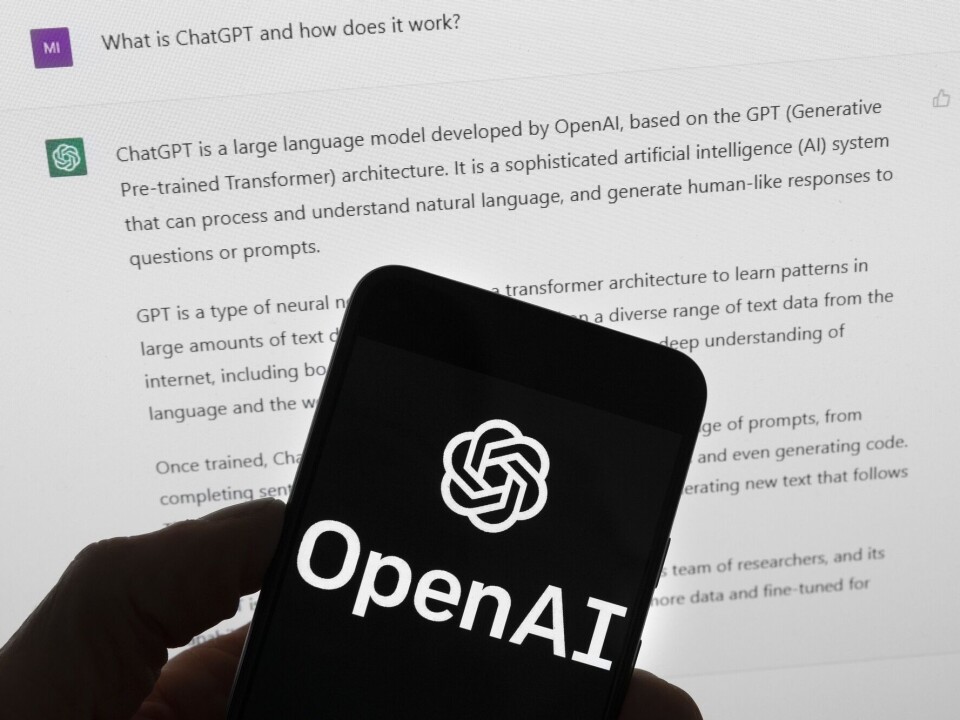THIS CONTENT IS BROUGHT TO YOU BY THE University of Agder - read more
“There's a kind of overconfidence that AI will solve most things"
Hardly any politicians ask critical questions about artificial intelligence, says researcher.

“Almost all politicians in the Nordics say yes to artificial intelligence. But the political governance behind developments is weak. Artificial intelligence is presented as the solution to most problems,” says social scientist Frans af Malmborg.
In his recent doctoral thesis from the University of Agder, he examined how politicians in the Nordic countries and the EU discuss and develop policies on artificial intelligence (AI).
The conclusion is clear. Regardless of political party or country, the message is the same: We need more artificial intelligence.

“Politicians view artificial intelligence as a driving force for efficiency and economic growth. But I find almost no one asking critical questions,” says Malmborg.
The EU sets the agenda
The researcher reminds us that the study was conducted before ChatGPT was launched in 2022. Since then, more critical voices have emerged.
“The study shows that politicians see artificial intelligence as something inevitable. It is seen as a development beyond political control. So, control is left to the market and EU regulations,” he says.
Malmborg has looked at political documents and debates in the EU, Sweden, Norway, Denmark, and Finland. He finds a consistent trend: Countries are adapting to EU policies.
“The EU, in turn, derives its understanding of AI from an optimistic narrative about technology and artificial intelligence that everyone seems to agree on. The EU builds its policies on the idea that Europe lags behind China and the US and must invest heavily to catch up. This narrative has gained a foothold everywhere,” he says.
He points out that both the market and industry largely shape the EU's direction. As a result, the policy becomes market-driven rather than state- and politically-governed.
“There's a kind of overconfidence that AI will solve most things,” says Malmborg.
Copy of EU policy
In the Nordic countries, politicians often speak as if they have their own AI policy. But in reality, most of it is copied from the EU, according to Malmborg.
“It's of course adapted to local conditions. In Sweden, for instance, the development is closely linked to companies like Volvo and Ikea. But the core idea that AI is positive and necessary is shared by all,” he says.
He has reviewed debates in the Swedish Parliament from 2016 to 2022. There he finds few traces of disagreement between the various parties.
“Everyone thinks the same: More AI is the way forward. There are almost no voices pointing out challenges related to privacy, labour rights, or climate,” says Malmborg.
Political differences are erased
There are usually clear ideological divides in political questions, such as taxation. But when it comes to AI, it's a different story.
“Even though there are nuances in what the technology can be used for, everyone agrees that we need more of the technology itself. It's striking,” says Malmborg.
He provides an example from the Swedish Parliament: A liberal politician argues that AI creates growth, while an environmental politician believes the technology can free up time for workers. Both view the technology positively, but for different reasons.
“This illustrates an important difference in values, but not in the view of the technology itself. There's general agreement that AI is beneficial,” says Malmborg.
Problematic for democracy
Malmborg believes the technological consensus is problematic for democracy.
“Politicians should discuss both advantages and disadvantages. When it comes to artificial intelligence, there's little willingness to challenge assumptions. This results in weak governance and far too much power given to large technology companies,” he says.
He says the time has come to develop political tools and ideological understanding to address the challenges brought by AI. Not least because the technology is changing the labour market, health services, and public sector at record speed.
AI is not just technology
Malmborg's research shows that AI is not just a neutral technology, but a political project rooted in certain ideas about efficiency, growth, and modernisation.
“This is about the kind of society we want. When all parties agree on more AI without discussing what it actually entails, we lose important political perspectives,” he says.
Reference:
af Malmborg, F.A.R. Artificial Intelligence – a Promethean Technology? Frames, Narratives and Arguments about AI in the EU an the Nordics 2016–2022, Doctoral dissertation at the University of Agder, 2025.
———
Read the Norwegian version of this article on forskning.no

This content is paid for and presented by the University of Agder
This content is created by the University of Agder's communication staff, who use this platform to communicate science and share results from research with the public. The University of Agder is one of more than 80 owners of ScienceNorway.no. Read more here.
More content from the University of Agder:
-
Fear being rejected: Half pay for gender-affirming surgery themselves
-
Study: "Young people take Paracetamol and Ibuprofen for anxiety, depression, and physical pain"
-
Research paved the way for better maths courses for multicultural student teachers
-
The law protects the students. What about the teachers?
-
This researcher has helped more economics students pass their maths exams
-
There are many cases of fathers and sons both reaching elite level in football. Why is that?




































